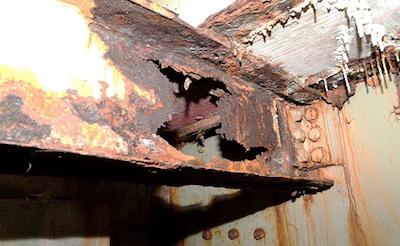
Work should begin late this week on repairs to the Arlington Memorial Bridge in Washington, D.C./NPS
Preliminary work should begin this week on getting the Arlington Memorial Bridge ready for a full-scale rehabilitation that could run three years and involve repairs to ensure the span doesn't collapse into the Potomac River.
The National Park Service expects to see work begin this week on pouring new concrete for the road surface, replacing rusted steel in the drawbridge that spans the middle of the bridge, and reinforcing the road deck from below before more comprehensive rehabilitation work begins this fall.
From June 1-June 4 and from June 8-June 11 the Park Service will close two lanes on the westbound side of Arlington Memorial Bridge to repair its road deck. This work is to prepare the bridge to support construction equipment and traffic during its full rehabilitation which will begin in fall 2018, the agency said.
The bridge, a monument to "the sacrifices and valor of our nation’s military personnel since its dedication in 1932," has long been in dire need of repairs. Last year the Federal Highway Administration told the Park Service that, due to the bridge's deterioriating condition, the span would be closed to traffic in 2021 without a full rehabilitation.
But Congress has not set aside a specific appropriation for the $227 million project. In December, Interior Secretary Ryan Zinke announced he had found a way to fund the repairs without Congress's help: The $227 million would come, in part, from $74 million in Federal Lands Transportation Program funds along with $33 million, or roughly one-fourth, of the Park Service's annual construction budget. Another $30 million was made available through an amendment U.S. Sen. Mark Warner, D-Virginia, attached to the Fiscal 2017 Appropriations Act, and the remaining $90 million from a FASTLANE grant.

Rusted supports in the Arlington Memorial Bridge need to be replaced/NPS
The use of that $33 million from the construction project impacts at least two Park Service projects, said NPS Chief Spokesman Jeremy Barnum.
"In one case, funding was reprogrammed for Arlington Memorial Bridge from a project that had not been started because the project was delayed for separate reasons." he said. "The project to rehabilitate the Elk Creek Visitor Center at Curecanti National Recreation Area was delayed because scope and design for the project needed to be reviewed and modified to address issues discovered during the schematic design phase that would incur more funding than allotted for the project. Issues included the replacement of dry rotted roof support structure and additional ADA compliance requirements.
"The only project that appears to have been delayed as a direct result of the prioritization of the Arlington Memorial Bridge project is the delayed repair of some bridge structures on the Baltimore-Washington Parkway in Maryland," said Mr. Barnum in an email.
The spokesman did not respond when asked for details on the Baltimore-Washington Parkway needs and costs.
However, Maryland's governor last fall proposed a $9 billion transportation plan to improve three congested highways, among them Baltimore-Washington Parkway, by adding additional express lanes. To do that, though, Maryland would need National Park Service approval.
According to a September 2017 story in the Baltimore Sun, the governor's $1.4 billion plan for the Baltimore-Washington Parkway "involves persuading the federal government to give the Baltimore-Washington Parkway, now controlled by the National Park Service, to the Maryland Transportation Authority."
Whether it was sheer coincidence or not, five months later when President Trump this past February broached his infrastructure plan, it included mention of divesting the federal government of the George Washington and Baltimore-Washington parkways.





